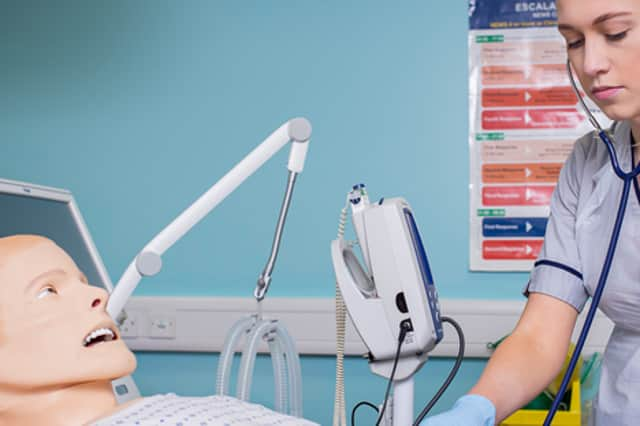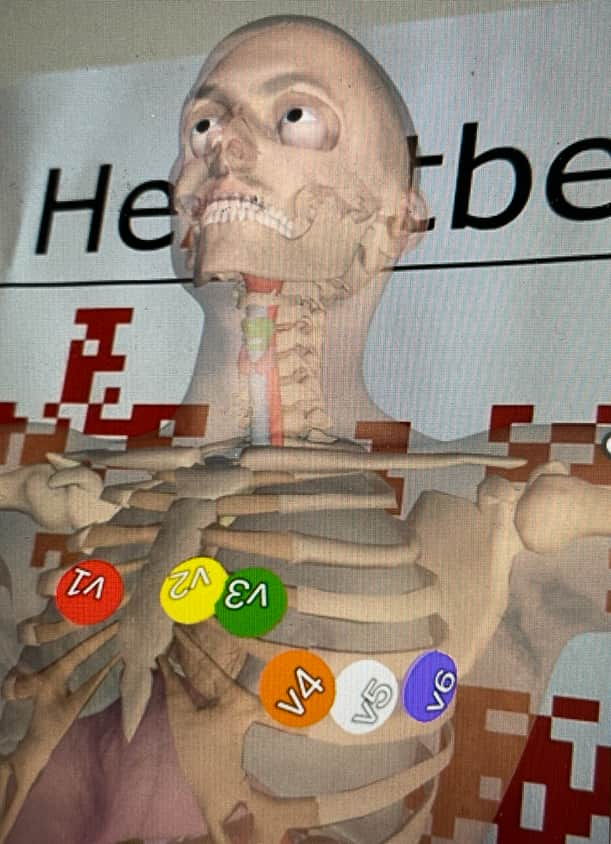Midwifery and nursing training at Edinburgh Napier University benefit from latest tech and simulation suite


The centre, known as the SCSC, forms part of the School of Health and Social Care and offers immersive environments - including NHS ward and clinic settings – to support the clinical skills training of next generation nurses and midwives.
It reproduces the environment of a hospital for all nursing specialisms: features include a critical care unit with adjoining technology control room, an accident and emergency bay, and three clinical wards with 14 beds in total. There is also a neo-natal room complete with simulated baby manikins, and even real live volunteer patients to give students the chance to learn how to use techniques on real members of the public.
The SCSC also houses a unique home setting for simulation scenarios to support home healthcare called SHELTER. Allied Health Professions and all fields of nursing learn and practice interdisciplinary in a safe environment.
Cathal Breen, Professor of Simulation and Clinical Skills, says: “All nursing students spend about 50 per cent of their time on placement in clinical settings (nationally), which is why the confidence they develop through clinical skill practice and immersive simulation scenarios we provide is so important.
“I am proud to lead the simulation strategy at ENU whereby our centre offers a significant space to develop regulated clinical training of a wide range of health professionals. My team facilitate technical skills acquisition using high fidelity technology, we support the diverse learning needs of our students by combining smartphone, online and Extended Reality formats with immersive simulated scenarios using our wards and manikins to prepare students for proficiency assessment. This supports students applying these skills when they undertake mandatory clinical placements in our NHS centres of excellence.”
It varies for each module but in a typical theory module, students spend about 30-40 per cent of their university time working within the SCSC.
“Our ‘hospital’ ward rooms have all the same equipment that students would find in the real clinical settings, enabling us to take them from novice to qualified professional over their three years of study.”
And while there are simulations set up with real live volunteer patients, it’s the manikins that can really increase the breadth of the training available: they can simulate a cardiac arrest, vary their breathing rate, blink or bleed and even shout or scream as the scenario requires.
“Lucinda is our pregnant manikin used for midwifery students, for example, to experience and manage a birthing simulation that provides learning outcomes equivalent to being on a placement. The observation of birth can be difficult for a student to access during placement, therefore, creating an immersive scenario, resulting in the birth of a simulation manikin baby, which breathes and cries, is an amazing resource for us at ENU.
“The training formats we use in our SCSC using combinations of high-fidelity technology, part task trainers and simulation scenarios adds Professor Breen. “The highly realistic simulation training is really valued by students, giving them confidence before going out on placements and interacting with patients in NHS centres of excellence”.
“And it means that when our graduates are on their first day in their new clinical careers, they are best supported in transitioning to the clinical roles”.


Offering unique new tech to students
There are big plans for the centre’s future in the coming year, which will see some existing space repurposed to create even more simulation areas.
New developments include the use of smartphone augmented reality applications for lung auscultation or electrocardiogram (ECG) simulations which has been developed by Professor Breen’s research group via a specially developed app thanks to a grant from the Physiological Society, the largest professional body in Europe. From the summer of 2024, students can use the app to rehearse at their own pace, at home or anywhere in the world, at any time that suits them ahead of formal assessments in the SCSC.
This unique new tech will also be offered to the university’s transnational education partners like MDIS Singapore, which offers the Edinburgh Napier Masters programme in Healthcare Management.
Importantly, the SCSC also plans to introduce the “livestreaming” of ‘immersive simulation’ that matches a clinical practice scenario. This virtual learning with the most modern recording equipment makes the simulation really powerful as a learning tool for students, according to Professor Breen.
Immersive simulations with child or adult manikins allow the technology to react in real time to build on the student’s experience, for example by deliberately simulating bad practice to highlight what not to do.
Advancing clinical education through innovative technology
A.C.E.-I.T., is a research project lead by Professor Breen whereby the assessment of clinical skills will be evaluated through technological evaluation. Students have to undertake many mandatory elements of assessment every year for training for new movements or lifting heavier patients, so this important digital development highlights how the university adapts its training to make use of best options.
And the simulation based education faculty are taking their research even further: SESAM, the Society in Europe for Simulation Applied to Medicine, will welcome four abstracts from Edinburgh Napier University for the first time when its 29th annual conference takes place in Prague in June 2024.
Fancy becoming a simulated patient?
The SCSC is now recruiting simulated patients – this is a voluntary role but training is provided.
If you're thinking about applying to study nursing or healthcare, volunteering as a patient first is a great way to see behind the scenes, or for experienced professionals and academics it's a means to give back by helping train new generation of healthcare professionals.
Contact [email protected] for more information and to sign up as a volunteer. If you have a previously diagnosed condition, had a therapy or surgery we would love to learn from you.
Study in a high-tech environment
If you’re thinking about a career in nursing or midwifery, Physiotherapy, Occupational Therapy and Social Work, Edinburgh Napier University has the latest technology to provide the best possible clinical training support and experience for students.
Apply today for an undergraduate degree in adult health, child health, mental health, or learning disabilities nursing, as well as midwifery, Physiotherapy, Occupational Therapy and Social Work.
Or there is an extensive list of postgraduate opportunities, including Master of Public Health, an MSc in Healthcare Management, Master of Clinical HealthcareTechnology or a PGCert in Epilepsy Studies; several other postgraduate courses in nursing, midwifery or neonatal care are also available.
Visit www.napier.ac.uk to start your journey today.